Materials Manager¶
|
|
Window toolbar |
| Window menu > Material |
The materials manager is used for organising and selecting materials. Each material has properties such as texture image, transparency, mirroring, shine, etc. that can be set in the Materials editor.
The materials manager can be opened via the menu VIEW > WINDOW > MATERIAL.

The materials are divided into categories. The number of materials contained is given in brackets for each folder.
Header functions The top row populated with functions in the management window.
Left mouse button The subfolders are displayed by double clicking on a folder icon. If there are no subfolders, the materials are visible. These can be allocated via drag and drop.
Right mouse button Various options that are described in detail below can be called up by clicking once on a folder, material or background.
Header functions¶

Search¶
Improved · 16 R1 · Improvements
Materials can be searched for using terms in the search bar. All materials containing the search terms are displayed.
Folder¶
If this button is pressed, the materials manager window is divided and the folders displayed in an Explorer view in the bottom half.
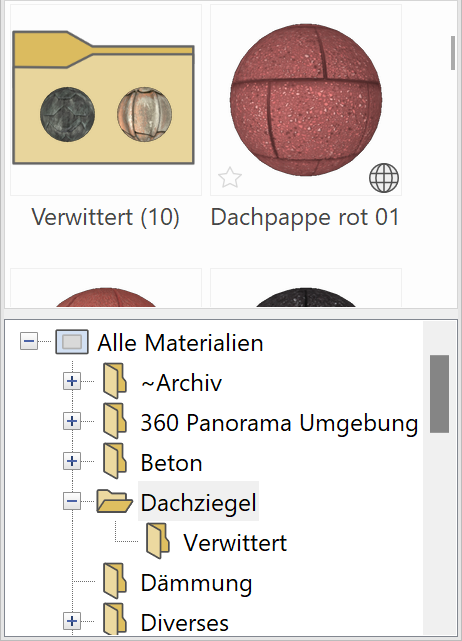
Further structures are displayed or hidden by clicking once on the plus or minus sign preceding the main titles. If you click on the folder itself, either the subfolders or the materials it contains are displayed at the top.
Up¶
![]()
Click this button to return to the higher-level folder.
Favourites¶
Improved · 16 R1 · Improvements
If this switch is active, only materials marked as favourites are displayed.
Hierarchical/flat display¶
The respective materials are initially displayed in the bottommost folder in the "Hierarchical view" (default setting). In "Flat display", however, all materials are visible in the same window regardless of the folder to which they belong.
Only the hierarchical view available for "All materials" and "Material database.
Filter¶
The materials are always saved in a database. It may be the case that materials that have not yet been saved are present in a drawing. This may be a result of an external drawing or new materials that you have not yet saved to the database.
The display of the folders and materials in the management window can be controlled in different ways using this toggle key.
All materials¶
This switch setting always displays all of the materials, regardless of whether they are present in the database or not.
All materials (besides standard)¶
New · ME 16 R1 · Improvements
![]()
This displays all the materials that were added or modified as a proprietary material and were not included in the original ELITECAD default material set.
Materials database¶
Only displays the materials that are saved in the database.
New materials in DB¶
New · ME 16 R1 · Improvements
![]()
Only displays the materials that were added or modified in the database within the time frame chosen.
A dialog opens when this is selected to allow you to choose the time frame. This selection is then used (until a different one is selected) to mark materials within that time frame with an asterisk to indicate it is newly added or modified.
Additionally, this dialog displays how long it has been since the last modification was implemented.
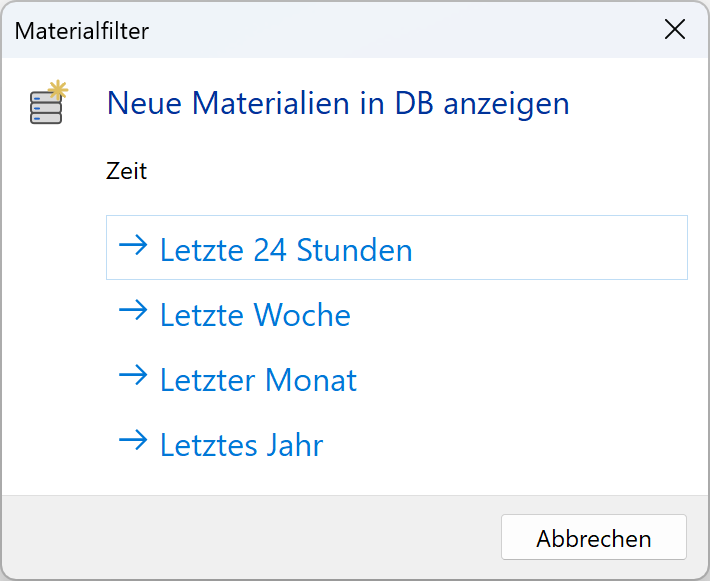
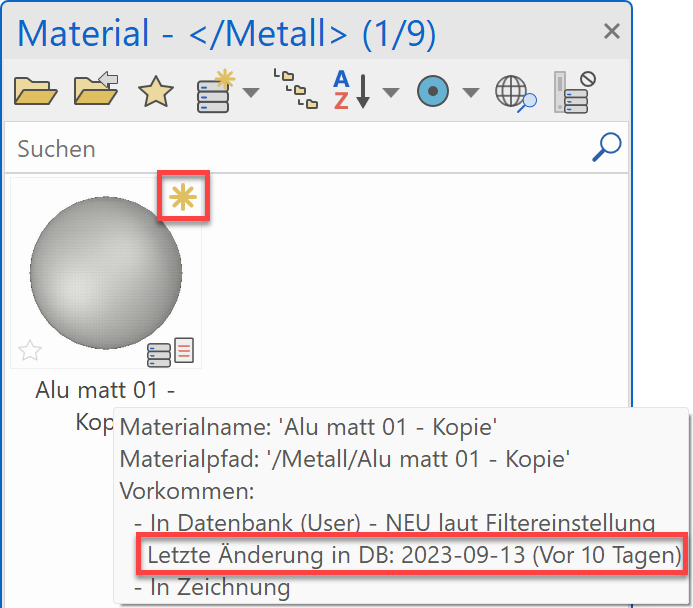
Drawing¶
Only displays the materials that are used in the drawing.
Image¶
Only displays the materials that are shown in the drawing.
Temporary materials¶
Only displays the materials that are not yet saved in the database.
Sort ascending/descending¶
Change the sorting to alphabetical order.
Tip
The management window can be refreshed by pressing F5 .
Sort by date¶
New · ME 16 R1 · Improvements
![]()
Change the sorting to date added to the database with the newest always shown at the top.
Assignment mode¶
There are various allocation options for applying materials to the construction parts. The surfaces are assigned materials according to the switch setting. The same options can be used for material to be deleted, which deletes the materials again.
Explanation
Materials are allocated via drag and drop. Left-click a material from the manager, hold down the mouse button and drag the material to the object or surface that is to receive the material. Depending on the current allocation mode, the material is then additionally allocated to multiple surfaces, e.g. all surfaces in an object.
On object¶
If the allocation mode is set to object, the entire object is allocated with the material unless it is an "intelligent" construction part such as a window or a door, etc.
Although these are objects, a distinction is made depending on whether the material is allocated to a frame, window sill or glass, etc.
Part of an object¶
The material always only occupies parts of an object.
On surface¶
Only occupies individual surfaces. Users should note that the allocation disappears if the object is edited and/or modified.
Replace¶
![]()
If this switch is active, the material that you drag to a surface with drag and drop is allocated to all surfaces that have the same material or colour as this surface.
On selection¶
If you want to allocate a material on a specific selection, you can make a prior selection on the screen and drag the material into the selection. It does not matter which switch setting is currently active.
Tip
If you want to allocate the same material to multiple surfaces or objects etc., there is a multiple allocation function. Drag the material onto a surface as normal. However, instead of releasing it, press the Shift key on the keyboard or the + sign. Click and hold down the mouse and move it to a different surface before pressing one of the two buttons.
This can be repeated any number of times.
Import of external materials¶
Improved · 16 R1 · Improvements
![]()
New materials can also be created by drag & drop graphic files into the material manager. This is also possible for entire folders. Material files can be downloaded from several platforms. An attempt is made to set the appropriate properties as automatically as possible.
Common platforms include:
>> Quixel Megascans (licensing)
Ignore archive¶
Improved · 16 R1 · Improvements
![]()
By activating this setting, the archive folder can be ignored when searching for materials in the database.
Right-click functions¶
Different context menus are displayed by right-clicking a folder, material or background.
Right-clicking a folder¶
The following context menu opens.
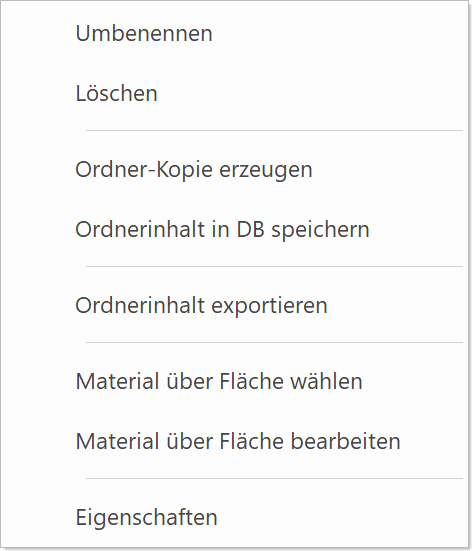
Note
The materials are saved in ELITECAD either as "user" or "global". This depends on the active storage type of the parameters under SETTINGS > OPTIONS > SYSTEM > CONFIGURATION.
This switch setting is also used for deleting. If a material has been saved as "global", it cannot be deleted as "user" or vice versa. A copy is created when renaming a "global" material as "user".
The occurrence of a material can be read in quick info.
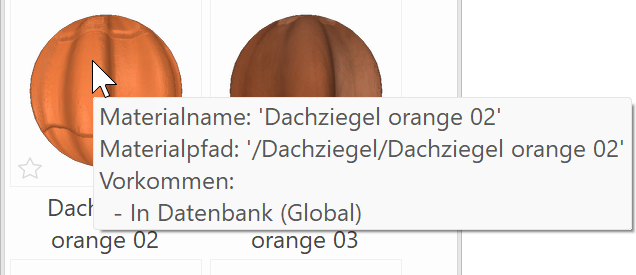
Rename¶
Folder names can be changed.
Delete¶
Folders can be deleted together with their entire contents.
Create copy of folder¶
Creates a copy of the folder including the entire contents.
Save folder content in DB¶
Saves the entire contents of the folder, depending on the "Storage type", in the database.
Export folder content¶
The folder contents can be exported as a file. This line type can be imported on a different workstation or to a remote office.
Select material over surface¶
See "Right-clicking on the background".
More info here.
Edit material over surface¶
See "Right-clicking on the background".
More info here.
Properties¶
Displays the properties of the folder.
Right-clicking a material¶
Displays the properties of the folder:
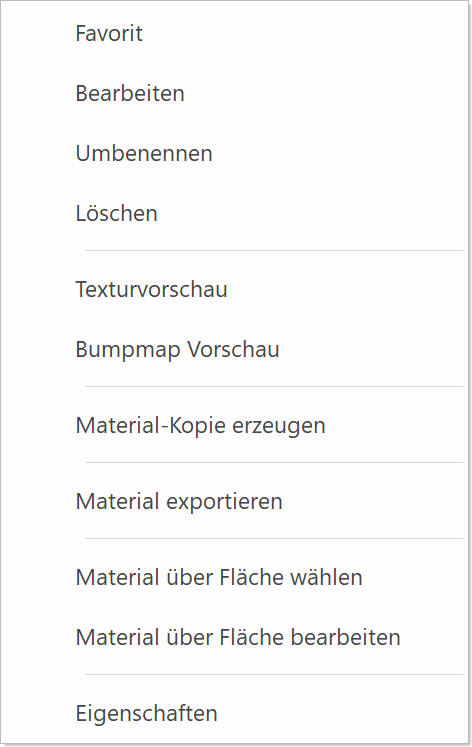
Favourite ¶
Improved · 16 R1 · Improvements
The material is declared as favourite.
Edit¶
The Material editor opens.
Rename¶
Materials can be renamed.
Delete¶
Materials can be renamed.
Texture preview¶
The original image is displayed.

Create copy of material¶
Creates a copy of the material.
Tip
If you want to select multiple folders or materials simultaneously, you can do this either by holding down Shift , Ctrl or by dragging a rectangle over the folders and materials. The context menu is abbreviated.
Export material¶
Materials can be exported as a file. These files can be imported on a different workstation or to a remote office.
Select material over surface¶
See "Right-clicking on the background".
More info here.
Edit material over surface¶
See "Right-clicking on the background".
More info here.
Show material assignments¶
All objects, sub objects or surfaces, where this material is assigned, are selected.
Properties¶
Displays the properties of the material.
Right-clicking on the background¶
Displays the properties of the material:
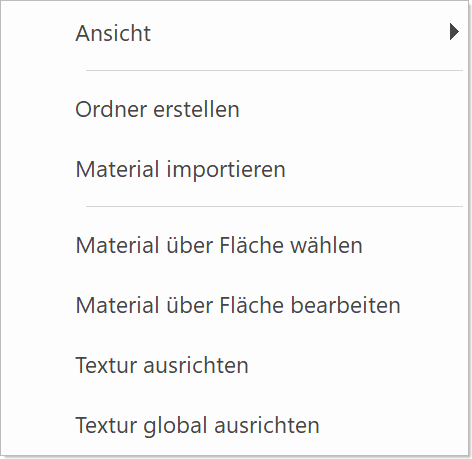
View¶
A menu appears beneath "View" in which the appearance of materials manager can be modified.
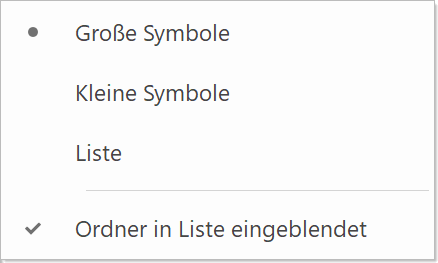
| Large symbols | Small symbols | List |
|---|---|---|
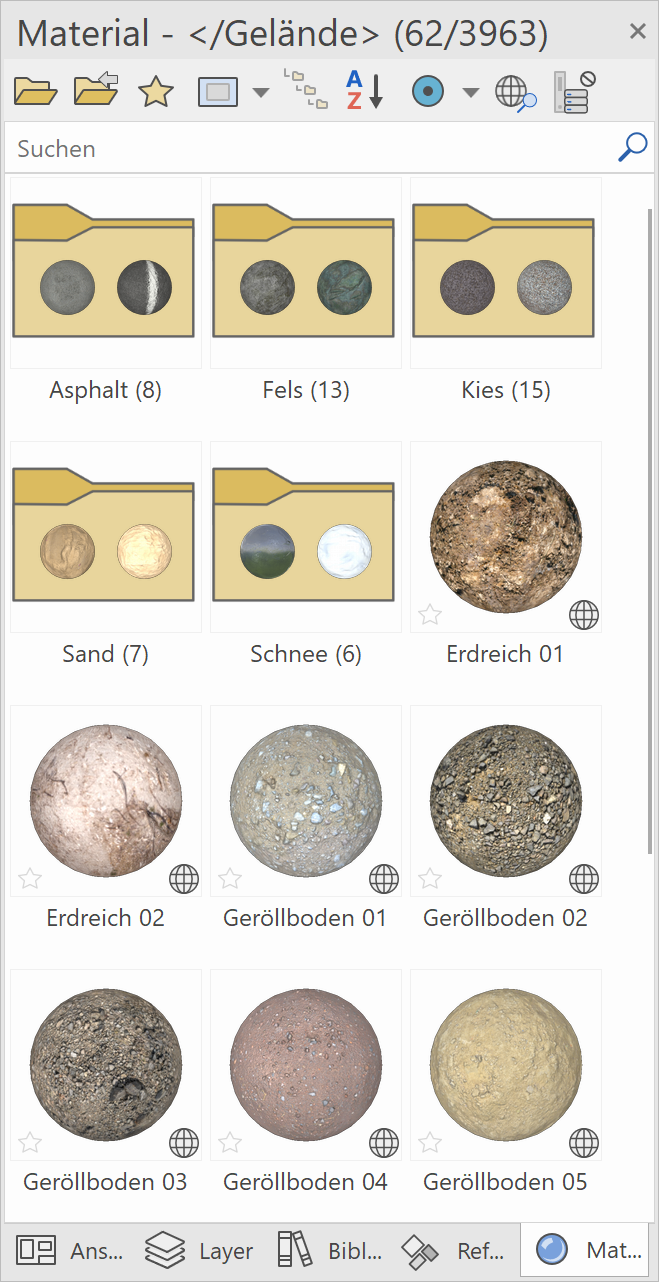 |
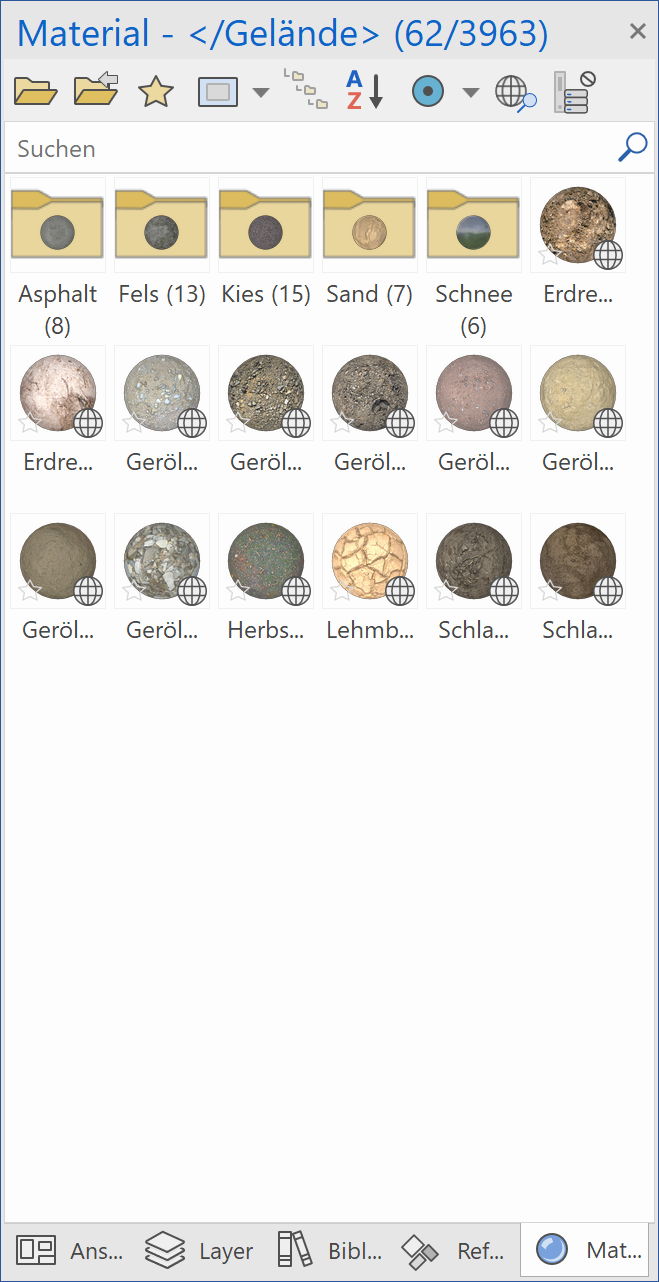 |
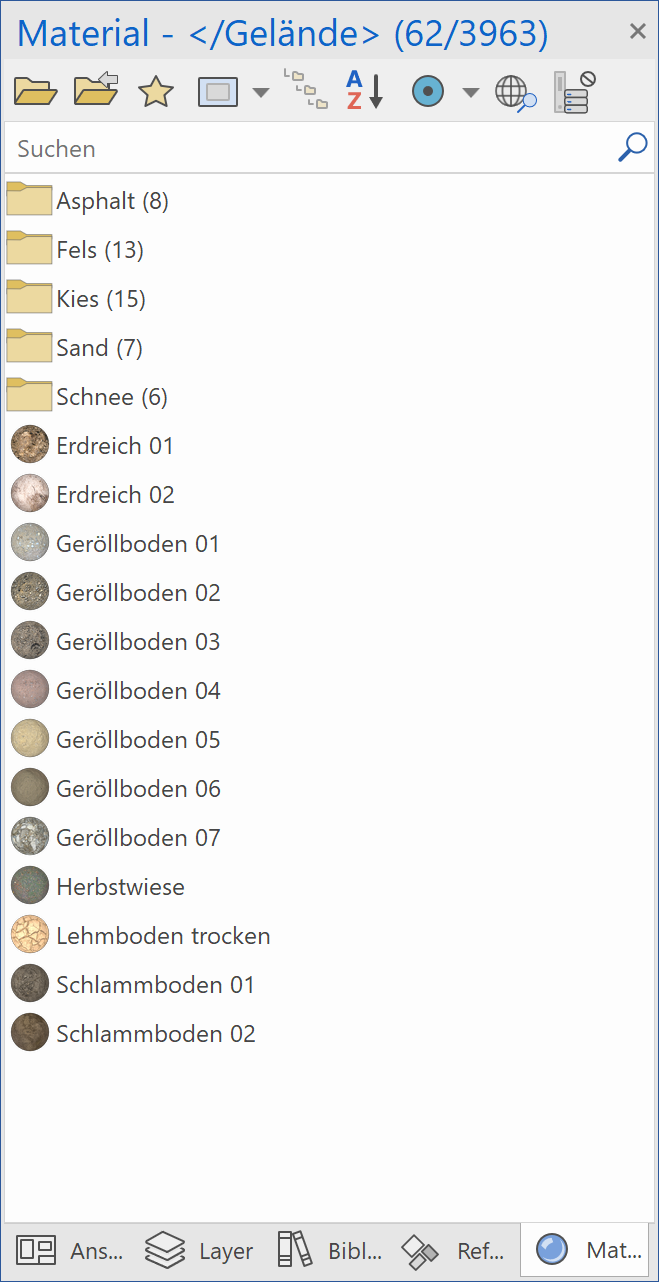 |
Improved · 16 R1 · Improvements
The symbol size can also be changed dynamically with the mouse wheel.
Improved · 16 R1 · Improvements
A small additional symbol at the bottom right indicates the origin of the material (drawing, database, temporary). With a click on the additional symbol, all uses of the material in the drawing are highlighted graphically as long as the mouse button remains pressed. A material becomes a favourite by clicking on the additional symbol at the bottom left.
| Database | Drawing | Temporary |
|---|---|---|
Create folder¶
Creates a new folder in the folder in which the menu item is called up.
Import material¶
Imports material data that was either exported from the materials manager (*.mydmp) or saved as parameters (*.par) in Messerli VIS (up to Release 12).
Select material over surface¶
If this is selected, a material in the drawing can then be clicked on that is displayed directly in the management window. (Blue frame)
If a surface is selected, that does not have any material but rather a 3D colour, a message is displayed.
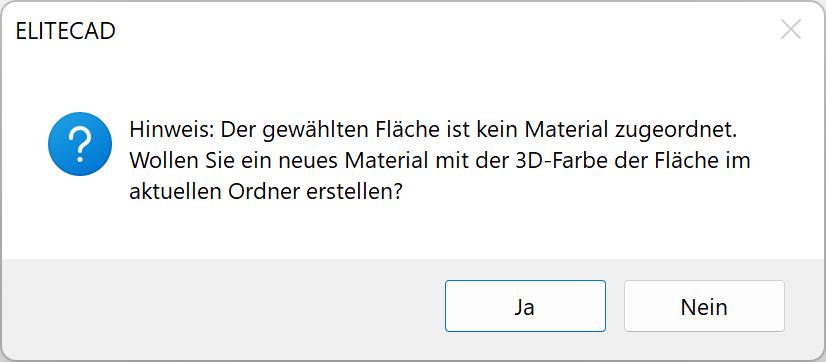
Selecting "Yes" automatically generates a new material that can then be processed.
The function is cancelled by selecting "No".
Edit material over surface¶
This option functions in exactly the same way as "Select material over surface", with the difference that the Materials editor opens straight away so changes to the settings can be made.
Tip
These two options are very useful for finding the material that has already been used and for editing it straight away if required.
Align texture¶
This function is used for orientating a texture on an edge that can be selected. The exact description of this function can be found in the chapter LAYOUT > MATERIAL > ALIGN TEXTURE.
Align texture globally¶
This function is used for orientating multiple textures on an edge that can be selected. The exact description of this function can be found in the chapter LAYOUT > MATERIAL > ALIGN TEXTURE GLOBALLY.